Related Research Articles
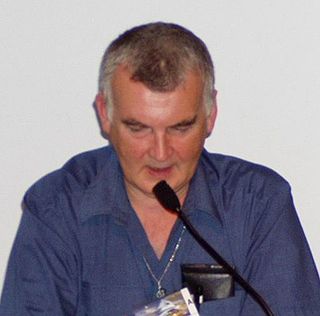
Kenneth Macrae MacLeod is a Scottish science fiction writer. His novels The Sky Road and The Night Sessions won the BSFA Award. MacLeod's novels have been nominated for the Arthur C. Clarke, Hugo, Nebula, Locus, and Campbell Memorial awards for best novel on multiple occasions. A techno-utopianist, MacLeod's work makes frequent use of libertarian socialist themes; he is a three-time winner of the libertarian Prometheus Award. Prior to becoming a novelist, MacLeod studied biology and worked as a computer programmer. He sits on the advisory board of the Edinburgh Science Festival.

Poul William Anderson was an American science fiction author from the 1940s until the 21st century. Anderson wrote fantasy novels, historical novels, and short stories. His awards include seven Hugo Awards and three Nebula Awards.

Gregory Dale Bear is an American writer and illustrator best known for science fiction. His work has covered themes of galactic conflict, artificial universes, consciousness and cultural practices, and accelerated evolution. His most recent work is the 2021 novel The Unfinished Land. Greg Bear has written over 50 books in total. Greg Bear was also one of the five co-founders of the San Diego Comic-Con.

The Moon Is a Harsh Mistress is a 1966 science fiction novel by American writer Robert A. Heinlein about a lunar colony's revolt against absentee rule from Earth. The novel illustrates and discusses libertarian ideals. It is respected for its credible presentation of a comprehensively imagined future human society on both the Earth and the Moon.

Algirdas Jonas "Algis" Budrys was a Lithuanian-American science fiction author, editor, and critic. He was also known under the pen names Frank Mason, Alger Rome, John A. Sentry, William Scarff, and Paul Janvier. He is known for the influential 1960 novel Rogue Moon.
Lester del Rey was an American science fiction author and editor. He was the author of many books in the juvenile Winston Science Fiction series, and the editor at Del Rey Books, the fantasy and science fiction imprint of Ballantine Books, along with his fourth wife Judy-Lynn del Rey.

Robert Silverberg is an American author and editor, best known for writing science fiction. He is a multiple winner of both Hugo and Nebula Awards, a member of the Science Fiction and Fantasy Hall of Fame, and a Grand Master of SF. He has attended every Hugo Awards ceremony since the inaugural event in 1953.

Singularitarianism is a movement defined by the belief that a technological singularity—the creation of superintelligence—will likely happen in the medium future, and that deliberate action ought to be taken to ensure that the singularity benefits humans.

Karen Joy Fowler is an American author of science fiction, fantasy, and literary fiction. Her work often centers on the nineteenth century, the lives of women, and alienation.
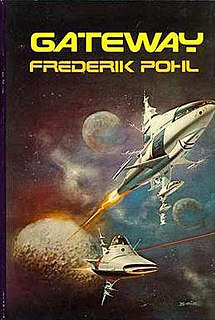
Gateway is a 1977 science fiction novel by American writer Frederik Pohl. It is the opening novel in the Heechee saga, with four sequels that followed. Gateway won the 1978 Hugo Award for Best Novel, the 1978 Locus Award for Best Novel, the 1977 Nebula Award for Best Novel, and the 1978 John W. Campbell Memorial Award for Best Science Fiction Novel. The novel was adapted into a computer game in 1992.
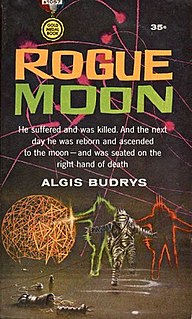
Rogue Moon is a short science fiction novel by American writer Algis Budrys, published in 1960. It was a 1961 Hugo Award nominee. A substantially cut version of the novel was originally published in F&SF; this novella-length story was included in The Science Fiction Hall of Fame, Volume Two, edited by Ben Bova. It was adapted into a radio drama by Yuri Rasovsky in 1979.

The Best of L. Sprague de Camp is a collection of writings by American science fiction and fantasy author L. Sprague de Camp, first published in hardback by Nelson Doubleday in February 1978 and in paperback by Ballantine Books in May of the same year as a volume in its Classic Library of Science Fiction. The book was reprinted by Ballantine in May 1986. It was reissued in trade paperback and ebook editions by Phoenix Pick in December 2014. It has also been translated into German.
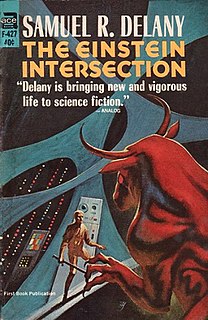
The Einstein Intersection is a 1967 science fiction novel by Samuel R. Delany. It won the Nebula Award for Best Novel in 1967 and was nominated for the Hugo Award for Best Novel in 1968. The title is a reference to Einstein's Theory of Relativity connecting to Kurt Gödel's Constructible universe, which is an analogy to science meeting philosophy. Delany's intended title for the book was A Fabulous, Formless Darkness.

Michaelmas (1977) is a science fiction novel by American writer Algis Budrys, first published as a serial in The Magazine of Fantasy & Science Fiction in August and September 1976, and published in revised form as a novel in 1977. Michaelmas is largely about a renowned newsman who in fact controls, rather than simply reports events thanks to his AI creation "Domino". The protagonist and narrative are loosely based on the world-protector Archangel Michael, while the book contains convincing near-future technology.
Artificial intelligence is a recurrent theme in science fiction, whether utopian, emphasising the potential benefits, or dystopian, emphasising the dangers.

Freehold is a military science fiction novel by Michael Z. Williamson, published in 2004 by Baen Books. The book tells the story of Kendra Pacelli, a young soldier who begins the book in the service of a world-dominant, authoritarian United Nations. Accused of a crime she did not commit, she flees Earth for the Freehold of Grainne where she struggles to adapt to the climate and culture of an ultra-libertarian planet. She eventually joins the Freehold military and fights in a war against a UN invasion.
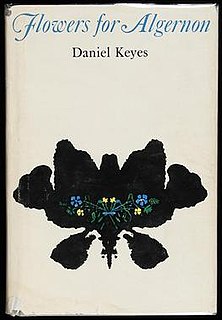
Flowers for Algernon is a short story by American author Daniel Keyes, later expanded by him into a novel and subsequently adapted for film and other media. The short story, written in 1958 and first published in the April 1959 issue of The Magazine of Fantasy & Science Fiction, won the Hugo Award for Best Short Story in 1960. The novel was published in 1966 and was joint winner of that year's Nebula Award for Best Novel.
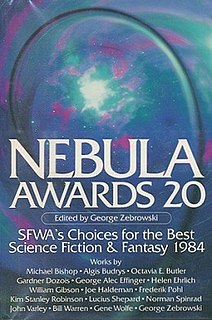
Nebula Awards 20 is an anthology of award winning science fiction short works edited by George Zebrowski. It was first published in hardcover and trade paperback by Harcourt Brace Jovanovich in November 1985.

Nebula Award Stories Seventeen is an anthology of award winning science fiction short works edited by Joe Haldeman. It was first published in hardcover by Holt, Rinehart and Winston in August 1983; a paperback edition was issued by Ace Books in June 1985 under the variant title Nebula Award Stories 17.
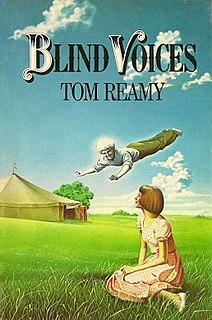
Blind Voices is a 1978 science fiction novel by Tom Reamy. Reamy's only novel, it was published "posthumously in a complete but not final draft" by Berkley Books.
References
- ↑ Budrys, Algis (February 2002). "Books". The Magazine of Fantasy & Science Fiction . Vol. 82, no. 2. pp. 33–35.
- ↑ "Review of ME: A novel of self-discovery" . Kliatt . Vol. 25, no. 7. October 1991. p. 8.
- ↑ "Title: Me: A Novel of Self-Discovery". Internet Speculative Fiction Database . Retrieved July 2, 2022.
- ↑ "Prometheus Award for Best Novel -- Nominees". Libertarian Futurist Society. Retrieved July 2, 2022.